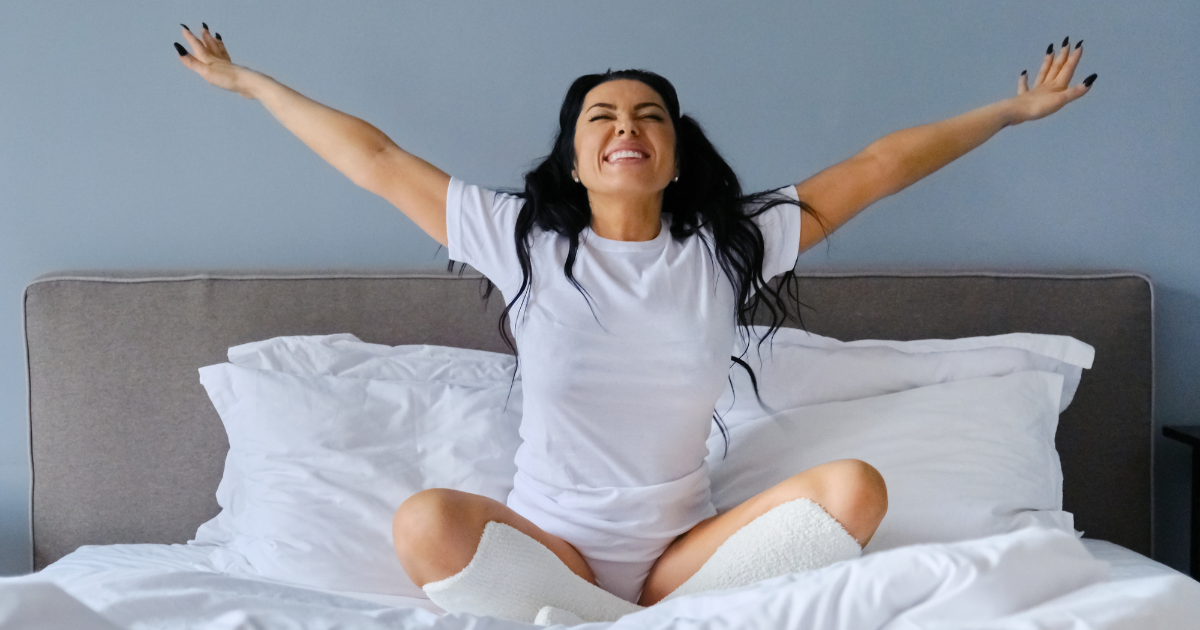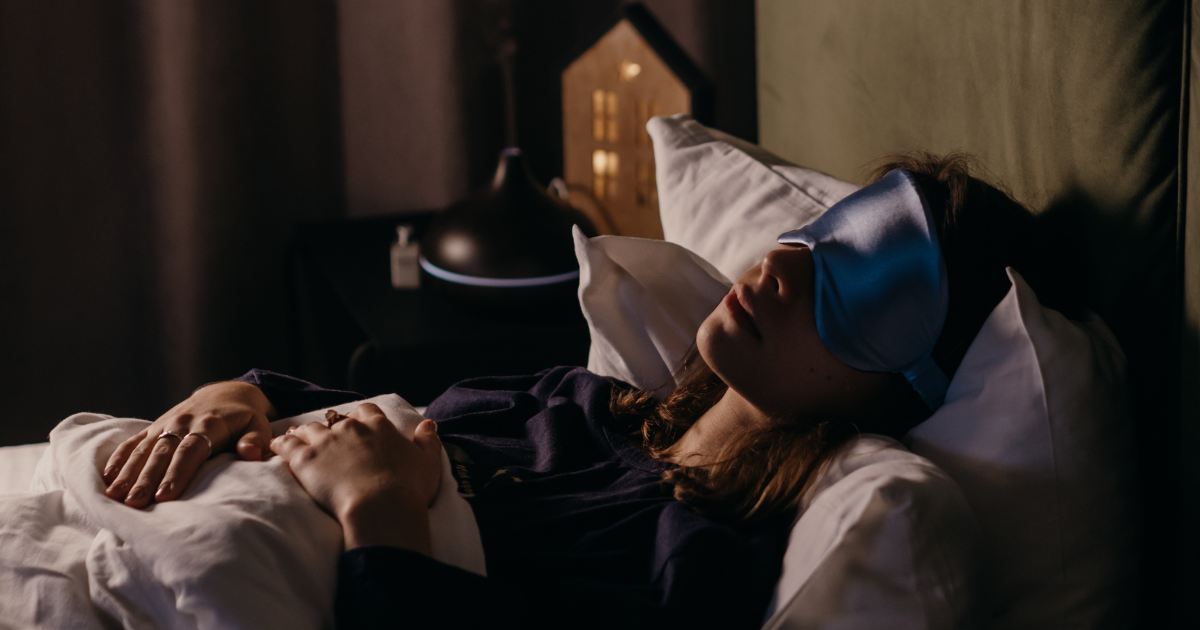What Is Restful Sleep and How Do We Achieve it?
Key Takeaways
- Restorative sleep is essential for both physical and mental health, leaving you feeling refreshed and energized.
- Sleep quality is just as important as sleep quantity — achieving deep sleep and REM sleep is crucial for repair, recovery, and cognitive function.
- Sleep hygiene plays a major role in achieving quality sleep. Good habits, such as a consistent sleep schedule and creating a relaxing bedtime routine, can improve your sleep quality.
- Many factors can impact sleep, including stress, sleep disorders like sleep apnea, and environmental factors like light and noise.
- LUMINAS Power Sleep Patches can help improve sleep quality by supporting your body’s natural rhythms, promoting relaxation, and aiding in the transition to deep sleep.

Sleep is vital for our physical and mental health, but not all sleep is created equal. To feel truly rested, we need restorative sleep, which is deep, uninterrupted sleep that leaves us feeling energized and ready to take on the day. In this blog, we'll explore what makes sleep "restful," how it impacts our overall well-being, and the steps we can take to improve sleep quality — including the role of LUMINAS Power Sleep Patches in enhancing your sleep experience.
What Is Restful Sleep?
Restful sleep isn’t just about the amount of time spent in bed — it's about the quality of that sleep. Restorative sleep refers to the deep, uninterrupted stages of sleep where your body can repair, regenerate, and recharge. During deep sleep and slow wave sleep, physical restoration occurs: muscles repair, tissue growth happens, and your immune system gets a boost. This is when you experience the most restorative sleep, which is essential for mental health and physical health.
REM sleep (Rapid Eye Movement sleep) plays a key role in brain health. It supports memory processing, cognitive function, and emotional balance. A good night’s sleep includes multiple cycles of light sleep, deep sleep, and REM sleep, with each stage contributing to good sleep health.
Signs You’re Not Getting Restful Sleep
Many people struggle with poor sleep quality, even if they’re sleeping for the recommended 7-9 hours per night. Here are some signs of non-restorative sleep:
- Feeling tired throughout the day, even after a full night’s rest
- Difficulty falling asleep or staying asleep
- Waking up feeling unrefreshed or sluggish
- Sleep deprivation can lead to irritability, difficulty concentrating, and low energy
These issues often result from poor sleep hygiene, which can disrupt sleep cycles, preventing you from reaching the deeper stages of sleep where most restorative functions occur. Poor sleep hygiene includes habits like using electronic devices before bed, irregular sleep schedule, or consuming caffeine too late in the day.

The Science Behind Sleep Cycles: How Your Body Recharges
Sleep cycles play a crucial role in achieving quality sleep. A full sleep cycle lasts around 90 minutes and consists of several stages:
- Light sleep: This is the initial stage of sleep where your body begins to relax.
- Deep sleep (slow wave sleep): This is the most restorative phase, promoting muscle repair, tissue growth, and a stronger immune system.
- REM sleep: Here, your brain is highly active, helping with memory processing and brain function.
For the best sleep quality, it’s important to allow your body to complete these cycles without interruptions. Disruptions, such as sleep apnea, poor sleep hygiene, or sleep disorders like obstructive sleep apnea, can cause fragmented sleep, preventing you from reaching the deeper, restorative stages.
What Can Impact Your Sleep?
Many factors can affect your ability to achieve restorative sleep. Understanding what might be disrupting your sleep can help you take action to improve it.
- Stress and Anxiety
Stress and anxiety can have a significant impact on sleep, making it difficult to fall asleep or stay asleep. These emotional states can trigger the fight or flight response, keeping your body in a heightened state of alertness and making it harder to relax into deep sleep. - Caffeine and Alcohol
Caffeine is a stimulant that can stay in your system for hours, making it difficult to fall asleep at night. Alcohol, while it may help you fall asleep initially, can disrupt sleep cycles, preventing you from reaching slow wave sleep and REM sleep. - Sleep Disorders
Conditions like sleep apnea, insomnia, and restless leg syndrome can significantly affect your ability to get quality sleep. Sleep apnea, in particular, interrupts your sleep cycle by causing your breathing to stop and start repeatedly, leading to fragmented sleep and poor sleep quality. - Poor Sleep Environment
Your bedroom environment plays a big role in sleep. Factors like noise, light, and temperature can impact your ability to fall asleep and stay asleep. Make sure your room is dark, quiet, and cool for the best sleep quality. - Irregular Sleep Schedule
A consistent sleep routine is crucial for regulating your circadian rhythm. Going to bed and waking up at the same time each day helps your body maintain healthy sleep patterns. An erratic sleep schedule can disrupt sleep and make it harder to get the amount of sleep you need for physical and mental recovery. - Chronic Pain
Chronic pain conditions such as arthritis or back pain can make it difficult to get comfortable enough to sleep well. Sleep troubles caused by pain can lead to non-restorative sleep, which leaves you feeling tired and irritable. - Bright Light Exposure
Exposure to bright light, especially from screens, can affect your body’s melatonin production and disrupt sleep. To help signal to your body that it’s time for rest, reduce exposure to bright light in the evening and consider using blue light-blocking devices. - Age-Related Changes
As we age, our sleep cycles change, and we tend to spend less time in slow wave sleep and REM sleep. This can make sleep feel less restorative, even with enough hours of sleep. Older adults may also experience sleep apnea or other sleep disorders more frequently.
Natural Deep Sleep Aid Support: Power Sleep Patches
Designed to help you wake up refreshed and ready to tackle the day, our Power Sleep patches are perfect for anyone struggling with frequent awakenings in the middle of the night or feeling unrested in the morning.
Key Benefits Include:
✔️ 100% Chemical-Free: Enjoy restful nights with an all-natural sleep aid, free from artificial additives.
✔️ Clear-Headed and Fresh: Wake up feeling mentally clear and fresh, without the risk of dependency.
✔️ Science-Backed Results: Benefit from patches developed through extensive scientific research for the most advanced sleep support.
Simple Ways to Improve Sleep Quality
Achieving a good night’s sleep isn’t just about what you do at night — it's about establishing healthy sleep habits throughout the day. Here are a few tips that can help you improve your sleep patterns and sleep cycles:
- Create a Consistent Sleep Schedule
Going to bed and waking up at the same time every day helps regulate your body’s internal clock. A consistent sleep routine enhances the likelihood of achieving deep sleep and REM sleep. - Limit Caffeine and Alcohol
Avoid caffeine and alcohol in the hours leading up to bedtime. These substances can interrupt sleep and prevent you from reaching deeper stages of sleep. - Establish a Relaxing Bedtime Routine
Wind down by practicing relaxation techniques like deep breathing, meditation, or taking a warm shower before bed to signal to your body that it’s time to sleep. - Keep Your Sleep Environment Comfortable
Make sure your bedroom is dark, cool, and quiet to create an ideal environment for sleep at night. Consider using earplugs, a sleep mask, or a white noise machine if noise is a problem. - Use LUMINAS Power Sleep Patches
Power Sleep Patches provide a natural, non-habit-forming solution to improve sleep quality, helping you enjoy great nights with ease and confidence.

When to Seek Professional Help
If you’re still having difficulty falling asleep or achieving restorative sleep despite your best efforts, it might be time to consult a sleep expert. Sleep disorders like sleep apnea or insomnia can significantly impact mental health, cognitive function, and your physical health. Common signs that you might need professional help include:
- Frequent waking during the night or difficulty staying asleep
- Excessive snoring or choking sounds during sleep (possible signs of obstructive sleep apnea)
- Feeling tired even after enough sleep
- Daytime fatigue and difficulty concentrating
Your doctor or a sleep specialist can help diagnose any underlying issues and recommend sleep medicine or therapies that can help improve your sleep quality.
Sleep Your Way to Better Health
Achieving restorative sleep is key to maintaining both physical health and mental health. By improving your sleep hygiene, following a consistent sleep schedule, and incorporating tools like LUMINAS Power Sleep Patches, you can work toward better sleep quality and wake up feeling refreshed, energized, and ready to face the day.
Remember, quality sleep is essential for a healthy, happy life. So, take steps today to improve your sleep — because a good night's rest is the foundation for better health and well-being.
Ready to experience more restorative sleep? Try LUMINAS Power Sleep Patches tonight and see how they can help you stay asleep longer and wake up feeling well-rested and ready to take on the day. Check out our website for more information and special offers!








